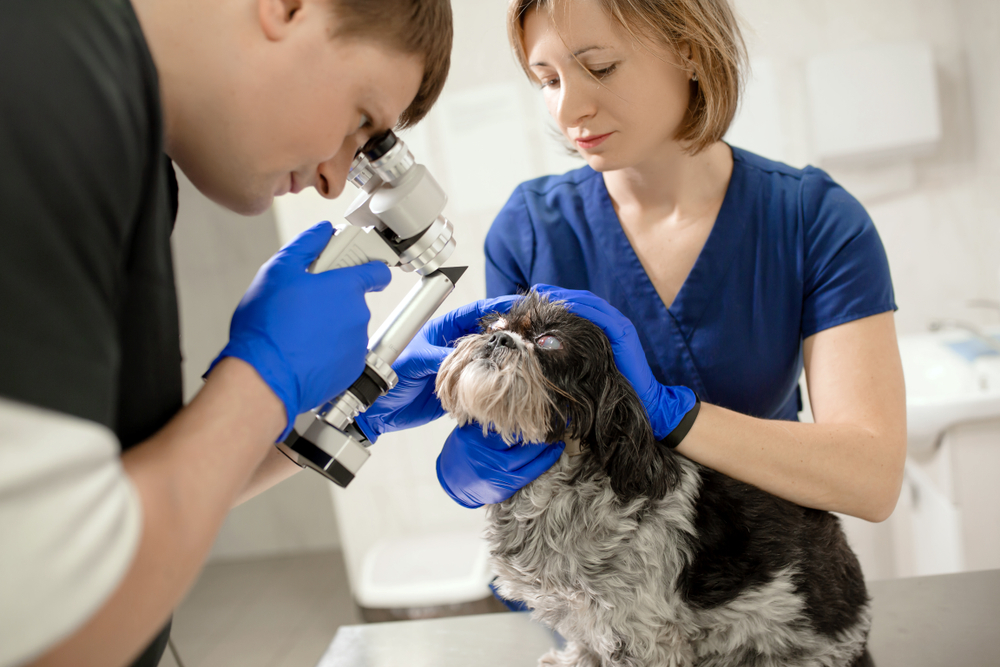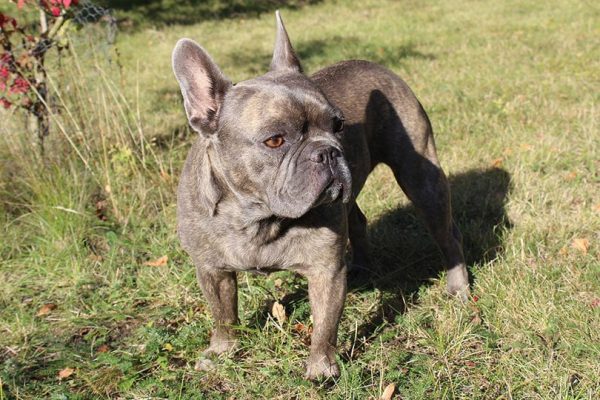Shih Tzus are affectionate, extroverted, and playful companions that genuinely relish human company. If you’ve been a Shih Tzu owner for any period of time, you know just how special these lively charmers can be. That’s why it can be so terrifying if your little fur buddy starts exhibiting strange behaviors like shaking.
Many things can cause a Shih Tzu to begin shaking. They may be trembling to express emotions like excitement or fear, or they may not be in control of the shaking at all due to a medical condition.
Read on to find 11 common reasons why your Shih Tzu is shaking and what you need to do when you see them exhibit this behavior.

The 11 Reasons Your Shih Tzu Is Shaking
1. They’re Excited
It doesn’t take much to make a Shih Tzu excited. Even just walking in the door at the end of your workday is enough to make some pups so happy that they’ll tremble or spin around from the excitement.
Your Shih Tzu’s enthusiasm toward you is completely normal (and adorable) as long as their excitement shakes aren’t accompanied by any concerning body language.
- How to Help Over-Excited Shih Tzus
While shaking with excitement can be normal, you still may want to address your pup’s overexcitement.
To calm overexcited pups, try to ignore their enthusiasm and redirect them to a more desirable behavior. For example, ask them to sit. Once they follow through, offer praise and reward them with something they love (e.g., a treat or praise).

2. They’re Afraid or Anxious
If your pup begins trembling after a triggering event (e.g., fireworks, sirens, or a visit to the vet), chances are they’re shaking due to fear or stress.
- How to Help Anxious or Fearful Shih Tzus
Your responsibility as a pet owner is to determine what’s triggering your pet. If it’s something you can control, you can remove your dog’s access to it. For example, if you know your Shih Tzu is terrified of fireworks, you can take them into a quiet room far from windows and doors on July 4th and implement other strategies that you have discussed with your vet or canine behaviorist.
Some cases of anxiety may be so severe that medical and/or behavioral intervention may be necessary. There are several strategies and medications your veterinarian can prescribe to address an overanxious Shih Tzu.
3. They’re Nauseous
Dogs can shake when they’re feeling queasy. Nausea is often accompanied by other signs, including restlessness, panting, drooling, gulping air, and retching.
Shih Tzus can become nauseous for a number of reasons, though the most common include eating something they shouldn’t have, poisoning, and gastroenteritis.
- How to Help Nauseous Shih Tzus
If your pup appears to be mildly nauseous but doesn’t exhibit any other signs, you may be able to get away with monitoring the situation from home. If they return to normal after a couple of hours, it’s likely the problem has resolved itself.
However, if other concerning signs accompany your Shih Tzu’s nausea or if they’re throwing up, call your veterinarian and make an appointment. Your vet may recommend testing like bloodwork and urine samples as a jumping-off point as they seek a diagnosis.
If you need to speak with a vet but can't get to one, head over to PangoVet. It's our online service where you can talk to a vet online and get the advice you need for your pet — all at an affordable price!

4. They’re Aging
Some dogs will develop tremors in their legs as they age due to weakening muscles or arthritis. Pups who are into their golden years may also exhibit other signs of aging, such as hearing loss, reduction of mental acuity, and changes in sleep patterns.
- How to Help Aging Shih Tzus
It’s essential to keep up with your regular wellness exams as your dog ages, ideally at least every 6 months, as they may become prone to certain conditions like joint, kidney, or heart disease, cancer, blindness, and more. The more information your veterinarian has about your dog before they begin showing signs of their age, the faster they’ll be able to pick up on slight nuances in their health and behavior that may indicate an issue.
Your vet may recommend making some changes in your pup’s environment to keep them safe as their bodies change.

5. They’re in Pain or Ill
Shih Tzus may display their pain or illness by trembling. Shivering can be a sign of fever, muscular pain, or urinary disease.
Dogs in pain will typically exhibit other signs, including flattened ears, low posture, irritability, aggression, crying, reluctance to play, lameness, and loss of appetite.
- How to Help a Shih Tzu in Pain
If you believe your Shih Tzu is in pain, the best thing you can do for them is to take them to your veterinarian. They’ll examine your Shih Tzu and, if necessary, run some tests to determine the source of your pup’s pain and create a treatment plan to get your pet back to full health.

6. They’ve Ingested Something Toxic
Many toxins and poisons can cause dogs to tremor and shake. According to the ASPCA, the 10 most common pet toxins include over-the-counter medications, human food and drinks, human prescription medication, chocolate, plants, fungi, rat poison, household products, insecticides, and recreational drugs.1
- How to Help a Shih Tzu That’s Ingested Something Toxic
If you believe your pup has gotten into something they shouldn’t have, you need to take them to the veterinarian as soon as possible. Some products can be life-threatening if you don’t seek immediate treatment. You can also try calling the ASPCA Animal Poison Control Center at (888) 426-4435 for advice.
7. They Have Epilepsy
Epilepsy isn’t just a condition that affects humans; our dogs can develop this neurological disorder too. This condition is characterized by recurrent seizures with or without a known cause. Seizures in dogs may cause involuntary movements, muscle twitching, paddling, loss of consciousness, neck stiffening, and loss of bladder and bowel control.
Please note, however, that dogs do not need to have epilepsy to have seizures. Seizures are a sign, not a disease. They’re a manifestation of abnormal motor activity occurring in the brain.
- How to Help a Shih Tzu with Seizures
If your dog is having seizures, it’s essential to stay as calm as possible. Keep track of how long the seizures last, and if possible, record them for your veterinarian. Protect your dog from hard objects and stairs as they’re seizing. You can cushion their head and hold them gently until they come to.
Make a point to call your vet after a seizure, even if your pup is acting normally again.

8. They Have Distemper
Luckily this condition is not that common nowadays thanks to widespread vaccination. However, if you have an unvaccinated Shih Tzu and they display signs of illness and generalized shaking, canine distemper could be the cause. Canine distemper is a highly contagious viral disease that attacks the immune system cells. It weakens a dog’s immune response and puts them at a higher risk of developing other infections. The virus can affect the respiratory, gastrointestinal, and nervous systems. Sadly, this condition is often fatal. However, dogs that do recover are usually stuck with muscular twitches and seizures for the rest of their lives.
Other signs of distemper include diarrhea, vomiting, yellow discharge from the nose and eyes, cough, and fever.
- How to Help a Shih Tzu with Distemper
There is no one treatment for this condition, but it is focused on reducing the intensity and severity of your pup’s signs. Treatment also typically involves supportive care while your dog tries to fight the virus. Your dog will need supportive treatment that may include antibiotics to control any secondary bacterial infections that occur as a result of distemper.
Your vet will likely recommend hospitalization for monitoring, intravenous fluid therapy and medication, and anti-seizure drugs.
9. They Have Generalized Tremor Syndrome
Idiopathic generalized tremor syndrome (IGTS), also sometimes called ‘Little white shaker syndrome’, causes head and body tremors. Affected pups have rhythmic, repetitive, and involuntary muscle movements that may or may not be localized to one area of the body.
The tremors can vary in severity from mild and barely noticeable to incapacitating, as they do not allow the pup to eat or walk properly.
- How to Help a Shih Tzu with IGTS
Your veterinarian will want to perform several tests to rule out any potential medical conditions that may be causing your Shih Tzu’s neurological signs. Once they have ruled out all medical causes for your dog’s tremors, they’ll officially diagnose them with IGTS. Once a diagnosis is received, your vet may refer you to a veterinary neurologist for advanced testing and more extensive workups.
This condition is often treated with corticosteroids to suppress the immune system. In most cases, the prognosis is good and most dogs improve within weeks of beginning treatment.

10. They Have Hypoglycemia
When a Shih Tzu’s blood sugar dips too low, they may shake, collapse, or even have a seizure. When this happens, the body can exhibit signs of not having enough energy to operate. The brain needs a steady supply of glucose to function properly, so this condition can be extremely dangerous and must be treated with extreme urgency.
Like all toy breeds, Shih Tzu puppies are particularly vulnerable to this condition, also known as hypoglycemia. Other signs include lack of appetite, lethargy, vomiting, weakness, and fainting.
- How to Help a Shih Tzu with Hypoglycemia
If you believe your Shih Tzu has hypoglycemia, immediate veterinary input is necessary to give your pup the best chance of recovery. Low glucose levels can be life-threatening, so time is of the essence. You can be instructed by your vet to rub corn syrup, honey, or glucose syrup on your pup’s gums.
Once at the clinic, your vet could give intravenous dextrose and they will likely perform a blood glucose test and likely a complete blood count. After examining your pup and learning more about their medical history, the vet may deem further testing necessary.
11. They Want Attention
Shih Tzus are intelligent little pups, and if they’ve gotten your attention by shaking in the past, they may do it again to elicit the same response.
- How to Help a Shih Tzu That Wants Your Attention
As easy as it is to give your pup the attention they desire, reinforcing attention-seeking behaviors can be a slippery slope. However, you can prevent such behaviors from happening in the future by ensuring all of your pup’s needs are being met. Start by providing them with enough attention by setting aside time every day to play with them and take them outside to burn off some energy.
Another great way to stop attention-seeking behaviors like shaking is to give your dog alternative behaviors. Teach them a more effective way to get what they want and then reward them for good behavior. For example, if your Shih Tzu starts shaking when you come home from work, teach them to sit to say hello and then give them a treat whenever they sit instead of shake when you walk in the door.


Final Thoughts
Shaking is an action that can be totally harmless, or it can indicate a more serious health concern. As with all dog behaviors, it’s essential to consider the context in which your dog is shaking. If they’re shaking whenever you come home from work, it could be that they’re excited to see you after being separated for so long.
However, if their shaking is accompanied by other concerning and out-of-character signs, an urgent visit to the veterinarian should be in order to rule out any potentially serious health conditions.
Featured Image Credit: Kirsten Thompson, Shutterstock





















2 Responses
Thank you. This article is very helpful.
Thank you! We're happy to help. 🙂